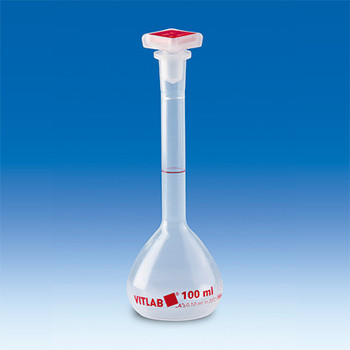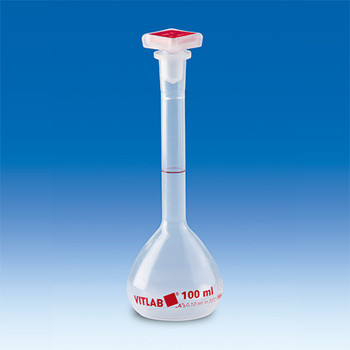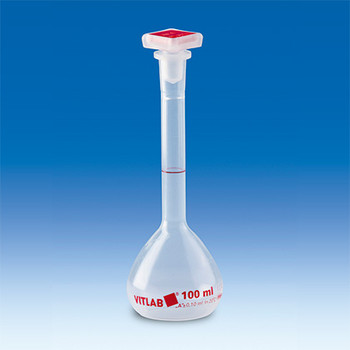Description
Volumetric Flask with NS Stopper, PP, Class B, 10mL
An excellent alternative to glass flasks, these plastic volumetric flasks meet Class B tolerances per DIN EN ISO 1042. Gravimetrically calibrated “to contain” at 20°C. Available in crystal clear PMP or highly transparent PP, with PP stopper caps or screw caps. The PMP flasks can tolerate thermal stress of up to 121°C (autoclaving) without permanent exceeding of the tolerance limits (PP flasks up to 60°C). However, to preserve markings, cleaning at no higher than 60°C is recommended.
None of the graduations are molded on the interior. They would be very difficult to mold in that way, and would interfere with the accuracy. Exterior molding also allows for a better grip on the item. However, it does differ by product, specifically:
- Graduated cylinders: All models have molded graduations. Some have screened overprint.
- Volumetric flasks: All models have a scored graduation, with coloring added.
- Erlenmeyer flasks: All models have screen printed graduations.
- Griffin Beakers: Most models have molded graduations (with the exception cat. no. V110204-V111004, ETFE Griffin beakers, and some small volume sizes). Some have screened overprint.
- Graduated pitchers: All models, with the exception of the nesting models, have molded graduations. Some have screened overprint. Nesting models have printed graduations.
Polyolefins, such as PP and PMP, as well as fluoroplastics (ETFE), have water-repellent surfaces that are very durable and easy to clean. For cleaning, depending on the level of contamination, commercially available neutral or alkaline detergents (i.e. Mucasol) can be used. Please note that no scrubbing agents or scouring pads should be used for labware made from plastics.
Plastic labware can be cleaned and dried in a laboratory diswasher, noting the temperature limits of the individual products. Due to their light weight, securing the labware with washing nets is recommended; and plastic-coated wire baskets will better protect against scratching.
Plastic labware can also be cleaned in an ultrasonic bath. However, direct contact with the acoustic membrane should be avoided.
The product description and/or specifications state whether or not the product can be autoclaved (note the temperature limits!). If the product is autoclavable, the recommended protocol is 20 minutes at 121°C (2 bar), according to DIN EN 285.
Prior to autoclaving plastic labware, ensure that no residual contamination remains on the item. Otherwise, the residual contamination will bake on solidly during the autoclaving process. Even substances that have no effect on the plastic at room temperature can have negative effects on the plastic during the autoclaving process, including persistant clouding. Additionally, microorganisms might not be killed effectively if they are protected by the residual contamination.
- Containers with screw tops or stoppers must be open during autoclaving to allow for pressure equalization - Autoclaving of a closed container will lead to the deformation or destruction of the container.
- Plastic labware should be stood upright on a level surface during autoclaving to avoid shape deformation - Plastic labware should NOT be laid on its side during autoclaving.
- No mechanical stresses should be present during autoclaving - For example, do not stack items.
- Do not autoclave any container that contains residual contamination or even rinsing agent.
- Some transparent plastics can absorb minute quantities of steam, which can lead to reversible clouding. This clouding disappears upon drying.
Class A Volumetric Flask, PMP, with NS Stopper, PP, Certified
| Volume mL | Tolerance ± mL | Height mm | Stopper NS | Qty/Pack | Cat. No. |
|---|---|---|---|---|---|
| 10 | 0.04 | 90 | 10/19 | 2 | V67704 |
| 25 | 0.04 | 115 | 10/19 | 2 | V67104 |
| 50 | 0.06 | 150 | 12/21 | 2 | V67204 |
| 100 | 0.10 | 180 | 14/23 | 2 | V67304 |
| 250 | 0.15 | 235 | 19/26 | 2 | V67404 |
| 500 | 0.25 | 270 | 19/26 | 2 | V67504 |
| 1000 | 0.40 | 310 | 24/29 | 1 | V67604 |
Class B Volumetric Flask, PMP, with NS Stopper, PP
| Volume mL | Tolerance ± mL | Height mm | Stopper NS | Qty/Pack | Cat. No. |
|---|---|---|---|---|---|
| 25 | 0.08 | 115 | 10/19 | 2 | V67195 |
| 50 | 0.12 | 150 | 12/21 | 2 | V67295 |
| 100 | 0.20 | 180 | 14/23 | 2 | V67395 |
| 250 | 0.30 | 235 | 19/26 | 2 | V67495 |
| 500 | 0.50 | 270 | 19/26 | 2 | V67595 |
| 1000 | 0.80 | 310 | 24/29 | 1 | V67695 |
Class B Volumetric Flask, PP, with NS Stopper, PP
| Volume mL | Tolerance ± mL | Height mm | Stopper NS | Qty/Pack | Cat. No. |
|---|---|---|---|---|---|
| 10 | 0.08 | 90 | 10/19 | 2 | V677941 |
| 25 | 0.08 | 115 | 10/19 | 2 | V671941 |
| 50 | 0.12 | 150 | 12/21 | 2 | V672941 |
| 100 | 0.20 | 180 | 14/23 | 2 | V673941 |
| 250 | 0.30 | 235 | 19/26 | 2 | V674941 |
| 500 | 0.50 | 270 | 19/26 | 2 | V675941 |
| 1000 | 0.80 | 310 | 24/29 | 1 | V676941 |
Class B Volumetric Flask, PMP, with Screw Caps, PP
| Volume mL | Tolerance ± mL | Height mm | Thread GL | Qty/Pack | Cat. No. |
|---|---|---|---|---|---|
| 10 | 0.08 | 90 | 18 | 2 | V677895 |
| 25 | 0.08 | 115 | 18 | 2 | V671895 |
| 50 | 0.12 | 150 | 18 | 2 | V672895 |
| 100 | 0.20 | 180 | 18 | 2 | V673895 |
| 250 | 0.30 | 235 | 25 | 2 | V674895 |
| 500 | 0.50 | 270 | 25 | 2 | V675895 |
| 1000 | 0.80 | 310 | 32 | 1 | V676895 |
Class B Volumetric Flask, PP, with Screw Caps, PP
| Volume mL | Tolerance ± mL | Height mm | Thread GL | Qty/Pack | Cat. No. |
|---|---|---|---|---|---|
| 10 | 0.08 | 90 | 18 | 2 | V677891 |
| 25 | 0.08 | 115 | 18 | 2 | V671891 |
| 50 | 0.12 | 150 | 18 | 2 | V672891 |
| 100 | 0.20 | 180 | 18 | 2 | V673891 |
| 250 | 0.30 | 235 | 25 | 2 | V674891 |
| 500 | 0.50 | 270 | 25 | 2 | V675891 |
| 1000 | 0.80 | 310 | 32 | 1 | V676891 |





